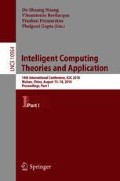Abstract
This paper extends BDI (belief, desire, and intention) logic by incorporating well-being emotion modalities (joy and distress) based on Ortony, Clore, and Collins’s (OCC) theory and obtain the emotional BDI logic called BDIE (belief, desire, intention and emotions) logic. We propose a new computational model of emotion triggers for BDI agents, called the interpreted observation-based BDIE system model (or BDIE model for short). The key point of this BDIE model is to express agent’s emotions, such as joy and distress, as a set of runs (computing paths), which is exactly a system in the interpreted system model, a well-known agent-model due to Halpern et al. We present a sound and complete proof system with respect to our BDIE model and specify a simplified auction scenario to illustrate the construction of the BDIE model and the specification of multi-agent systems involving agents’ emotional states using BDIE logic.
Access this chapter
Tax calculation will be finalised at checkout
Purchases are for personal use only
References
Reisenzein, R., Hudlicka, E., Dastani, M., Gratch, J., Hindriks, K., Lorini, E., Meyer, J.-J.C.: Computational modeling of emotion: toward improving the inter-and intradisciplinary exchange. IEEE Trans. Affect. Comput. 4(3), 246–266 (2013)
Rao, A.S., Georgeff, M.P.: The semantics of intention maintenance for rational agents. In: Proceedings of the 14th International Joint Conference on Artificial Intelligence (IJCAI 1995), pp. 704–710. IJCAI, Melbourne, Australia (1995)
Meyer, J.-J.C., van der Hoek, W., van Linder, B.: A logical approach to the dynamics of commitments. Artif. Intell. 113(1–2), 1–40 (1999)
Hu, X., Bai, K., Cheng, J., Deng, J., Guo, Y., Hu, B., Wang, F.: MeDJ: multidimensional emotion-aware music delivery for adolescent. In: Proceedings of the 26th International Conference on World Wide Web Companion (WWW 2017), pp. 793–794. ACM, Perth (2017)
Fagin, R., Halpern, J.Y., Moses, Y., Vardi, M.: Reasoning About Knowledge. MIT Press, Cambridge (2004)
Wooldridge, M.: Computationally grounded theories of agency. In: The 4th International Conference on MultiAgent Systems Proceedings (ICMAS 2000), pp. 13–20. IEEE, Washington, DC (2000)
Jin, L., Li, S., Hu, B.: RNN models for dynamic matrix inversion: a control-theoretical perspective. IEEE Trans. Industr. Inf. 14(1), 189–199 (2018)
Ortony, A., Clore, G.L., Collins, A.: The Cognitive Structure of Emotions. Cambridge University Press, Cambridge (1990)
Bagozzi, R.P., Dholakia, U.M., Basuroy, S.: How effortful decisions get enacted: the motivating role of decision processes, desires, and anticipated emotions. J. Behav. Decis. Making 16(4), 273–295 (2003)
Chen, J., Hu, B., Moore, P., Zhang, X., Ma, X.: Electroencephalogram-based emotion assessment system using ontology and data mining techniques. Appl. Soft Comput. 30, 663–674 (2015)
Strongman, K.T.: The Psychology of Emotion. From Everyday Life to Theory. Wiley (2003)
Adam, C., Herzig, A., Longin, D.: A logical formalization of the OCC theory of emotions. Synthese 168(2), 201–248 (2009)
Steunebrink, B.R., Dastani, M., Meyer, J.-J.C.: A formal model of emotion triggers: an approach for BDI agents. Synthese 185(1), 83–129 (2012)
Meyer, J.-J.C.: Reasoning about emotional agents. Int. J. Intell. Syst. 21(6), 601–619 (2006)
Pereira, D., Oliveira, E., Moreira, N.: Formal modelling of emotions in BDI agents. In: Sadri, F., Satoh, K. (eds.) CLIMA 2007. LNCS (LNAI), vol. 5056, pp. 62–81. Springer, Heidelberg (2008). https://doi.org/10.1007/978-3-540-88833-8_4
Gluz, J., Jaques, P.A.: A probabilistic formalization of the appraisal for the OCC event-based emotions. J. Artif. Intell. Res. 58, 627–664 (2017)
Broekens, J., Bosse, T., Marsella, S.C.: Challenges in computational modeling of affective processes. IEEE Trans. Affect. Comput. 4(3), 242–245 (2013)
Su, K., Sattar, A., Wang, K., Luo, X., Governatori, G., Padmanabhan, V.: Observation-based model for BDI-agents. In: AAAI Conference on Artificial Intelligence (AAAI 2005), pp. 190–195. AAAI, Pittsburgh (2005)
Acknowledgments
This work is supported by the National Basic Research Program of China (973 Program, No. 2014CB744600), the National Natural Science Foundation of China (No. 61632014, No. 61210010), the Program of Beijing Municipal Science & Technology Commission (No. Z171100000117005), the Program of International S&T Cooperation of MOST (No. 2013DFA11140), and the Northwest Normal University Foundation (NWNU-LKQN-14-5).
Author information
Authors and Affiliations
Corresponding author
Editor information
Editors and Affiliations
Rights and permissions
Copyright information
© 2018 Springer International Publishing AG, part of Springer Nature
About this paper
Cite this paper
Su, Y., Hu, B., Dai, Y., Rao, J. (2018). A Computationally Grounded Model of Emotional BDI-Agents. In: Huang, DS., Bevilacqua, V., Premaratne, P., Gupta, P. (eds) Intelligent Computing Theories and Application. ICIC 2018. Lecture Notes in Computer Science(), vol 10954. Springer, Cham. https://doi.org/10.1007/978-3-319-95930-6_41
Download citation
DOI: https://doi.org/10.1007/978-3-319-95930-6_41
Published:
Publisher Name: Springer, Cham
Print ISBN: 978-3-319-95929-0
Online ISBN: 978-3-319-95930-6
eBook Packages: Computer ScienceComputer Science (R0)

